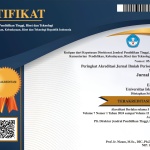The Foreclosed Collaterals As A Resolution For Bad Credit In Indonesia Banking System
Abstract
This research aim to understand the condition when a customer is no longer able to pay or repay a loan is called bad credit. This condition can actually cause many problems, ranging from difficulties in obtaining credit approvals to blacklisting by the bank. Collaterals are one of the requirements from the Bank when giving credit loans so that those collaterals can guarantee the credit’s acquittal should the debtor be breached. If there is a case of bad debts, banks have the option to solve the credit loan through the process of Foreclosed Collaterals. This journal is written on a legal and juridical-normative research, emphasizing the usage of written documents as the main sources of law. The collateral purchases are written in Article 12A Number 10 of 1998 of the Constitution on how banks may purchase the collaterals with or without auctions to solve bad credits even faster. Considering that Article 20 of the Constitution on Mortgage Rights has already written ways on collateral executions, therefore the warrant payment will follow the option of Foreclosed Collaterals. Reporting from the official website of Bank Indonesia (BI), to minimize the risk of increasing bad loans, BI issued PBI (Bank Indonesia Regulation) No. 14/2/PBI/2012 concerning APMK (Card-Based Payment Instruments). The regulation was made to reduce the risk of negative impacts from using credit cards as debt instruments to the extent that they reach excessive limits. Using statute and conceptual approaches, it is inferred that Foreclosed Collateral purchase procedures can be done in 3 (three) different ways, followed through the Settlement Efforts, where the ownership of the collaterals must be switched to another in 1 (one) year time.
Keywords
Full Text:
PDFReferences
Journals:
Alfis Setyawan, “Tinjauan Yuridis Penggunaan Surat Kuasa Jual Terhadap Penjualan Objek Hak Tanggungan Dalam Penyelesaian Kredit Macetâ€, Jurnal Cahaya Keadilan, 4.1 (2016), 1-21.
Lady Davina Windsor Enoch, ‘Penyelesaian Kredit Macet Melalui Pembelian dan Penjualan Agunan oleh Pihak Bank Menurut Undang-Undang No. 10 Tahun 1998 Tentang Perbankan’, Lex Privatum, 7.1 (2019), 75-82.
Nur Muhammad Dilapanga, “Agunan Yang Diambil Alih: Sebuah Mekanisme Dalam Penyelesaian Kredit Macetâ€, Jurnal Ilmu Sosial dan Pendidikan, 5.2 (2021), 156-163.
Books:
Johannes Ibrahim. 2004. Cross Default and Cross Collateral Sebagai Upaya Penyelesaian Kredit Bermasalah. Bandung. Refika Aditama.
Salim H.S. 2010. Perkembangan Teori Dalam Ilmu Hukum. Jakarta. Rajawali Pers.
Trisadini P. Usanti dan Abd. Shomad. 2017. Hukum Perbankan. Jakarta.Kencana.
Ferry N. Idroes. 2008. Manajemen Risiko Perbankan: Pemahaman Pendekatan 3 Pilar Kesepakatan Basel II Terkait Aplikasi Regulasi dan Pelaksanaannya di Indonesia. Jakarta. Rajawali Press.
Peter Mahmud Marzuki. 2017. Penelitian Hukum. Jakarta. Kencana.
Sutarno. 2003. Aspek-Aspek Hukum Perekreditan pada Bank. Bandung. Alfabeta.
Trisadini Prasastinah Usanti dan Nurwahjuni. 2014. Model Penyelesaian Kredit Bermasalah. Surabaya. Revka Petra Media.
Thesis:
Denita Cahyanti Wahono, “Bea Perolehan Hak Atas Tanah dan Bangunan Dalam Pembelian Agunan Sementara†(Universitas Airlangga, 2021).
Nalia Safitri, “Peranan Notaris dalam Pelaksanaan Pengambilalihan Aset Debitor (AYDA) Sebagai Alternatif Penyelesaian Kredit Macet Pada Bankâ€, (Universitas Indonesia, 2013).
DOI: https://dx.doi.org/10.30659/jdh.v4i4.18061
Refbacks
- There are currently no refbacks.
View My Stats

This work is licensed under a Creative Commons Attribution 4.0 International License.
Jurnal Daulat Hukum has been indexed in:

